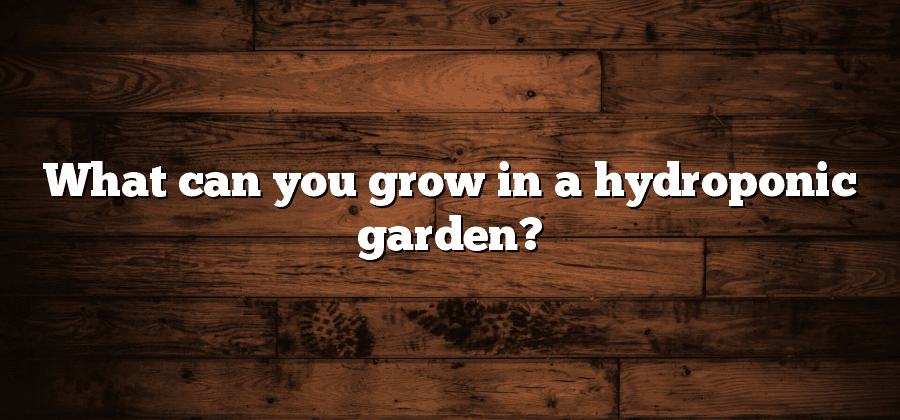Benefits of Hydroponic Gardening
Hydroponic gardening offers several benefits that make it an attractive option for both commercial growers and home gardeners. One major advantage is the ability to control and optimize the growing environment. With hydroponics, growers have complete control over factors such as nutrient levels, pH, temperature, and lighting. This allows for greater precision and maximizes plant growth and productivity. By eliminating the reliance on soil, hydroponic gardening also reduces the risk of soil-borne pests and diseases, further contributing to healthier plants.
Another benefit of hydroponic gardening is its water efficiency. Compared to traditional soil-based gardening, hydroponic systems use significantly less water. This is because water is continuously recirculated and reused within the system, minimizing water waste. Additionally, the controlled environment of hydroponics helps reduce evaporation, further conserving water. This aspect is particularly important in water-scarce regions or areas where drought conditions are common. Overall, hydroponics allows for more sustainable and eco-friendly cultivation, making it a promising option for the future of gardening.
Different Types of Hydroponic Systems
Hydroponic gardening has gained immense popularity among both novice and experienced gardeners. This innovative method of growing plants without soil offers numerous advantages, including efficient use of water, space, and nutrients. To cater to the diverse needs and preferences of gardeners, there are different types of hydroponic systems available in the market.
One of the most commonly used systems is the nutrient film technique (NFT), which involves a constant flow of nutrient-rich water over a slanted tray or tube. This allows the plant roots to absorb the necessary nutrients while also providing essential oxygen. Another popular option is the deep-water culture (DWC) system, where plants are suspended in a nutrient-rich solution. The roots are submerged in the water, providing constant access to nutrients and oxygen. Additionally, there are also systems like the aeroponics system, which uses a fine mist to deliver water and nutrients to the plant roots. These different types of hydroponic systems offer gardeners various choices to cater to their specific needs and growing preferences.
Leafy Greens and Herbs in Hydroponics
Leafy greens and herbs are an excellent choice when it comes to hydroponic gardening. These plants thrive in a controlled environment and can be grown year-round, providing an abundant supply of fresh, nutrient-rich greens for your table. With hydroponics, you have the option to grow a variety of leafy greens such as lettuce, kale, spinach, and herbs like basil, mint, and cilantro without the need for soil.
One of the main advantages of growing leafy greens and herbs hydroponically is the increased growth rate and yield. The plants receive a constant supply of water and nutrients, allowing them to grow faster and produce higher yields compared to traditional soil gardening. Additionally, hydroponic systems provide optimal conditions for these plants, such as the right temperature, pH levels, and lighting, resulting in healthier and more flavorful greens and herbs.
Growing Fruits in Hydroponic Gardens
When it comes to growing fruits, hydroponic gardens offer several advantages over traditional soil-based gardening. One of the key benefits is the ability to control and optimize the nutrient intake of the plants. In hydroponics, nutrients are directly delivered to the roots in a water-based solution, ensuring that the plants receive the exact amount of nutrients they need for optimal growth. This allows for faster and healthier fruit development, resulting in higher yields.
Another advantage of growing fruits in hydroponic gardens is the ability to create the ideal environment for fruit-bearing plants. The controlled conditions in hydroponics, such as temperature, humidity, and light, can be customized to suit the specific needs of each fruit variety. This means that fruits can be grown year-round, regardless of the seasonal limitations in traditional gardening. Additionally, the absence of soil in hydroponic systems reduces the risk of soil-borne diseases and pests, providing a cleaner and more hygienic environment for the plants.
Flowers and Ornamental Plants for Hydroponics
Hydroponic gardening is not just limited to edible plants; it can also be a wonderful way to cultivate beautiful flowers and ornamental plants. With the right system and proper care, you can create stunning displays of color and fragrance that rival any traditional garden.
One of the key advantages of growing flowers and ornamental plants hydroponically is the precise control you can have over their environment. From nutrient levels to pH balance and lighting, every aspect can be tailored to meet the specific needs of each type of plant. This fine-tuned environment often results in healthier and more vibrant flowers with longer blooming periods. Additionally, because hydroponic systems use water and nutrients more efficiently than traditional soil-based gardens, you may find that your flowers require less maintenance and resources while still flourishing beautifully.






